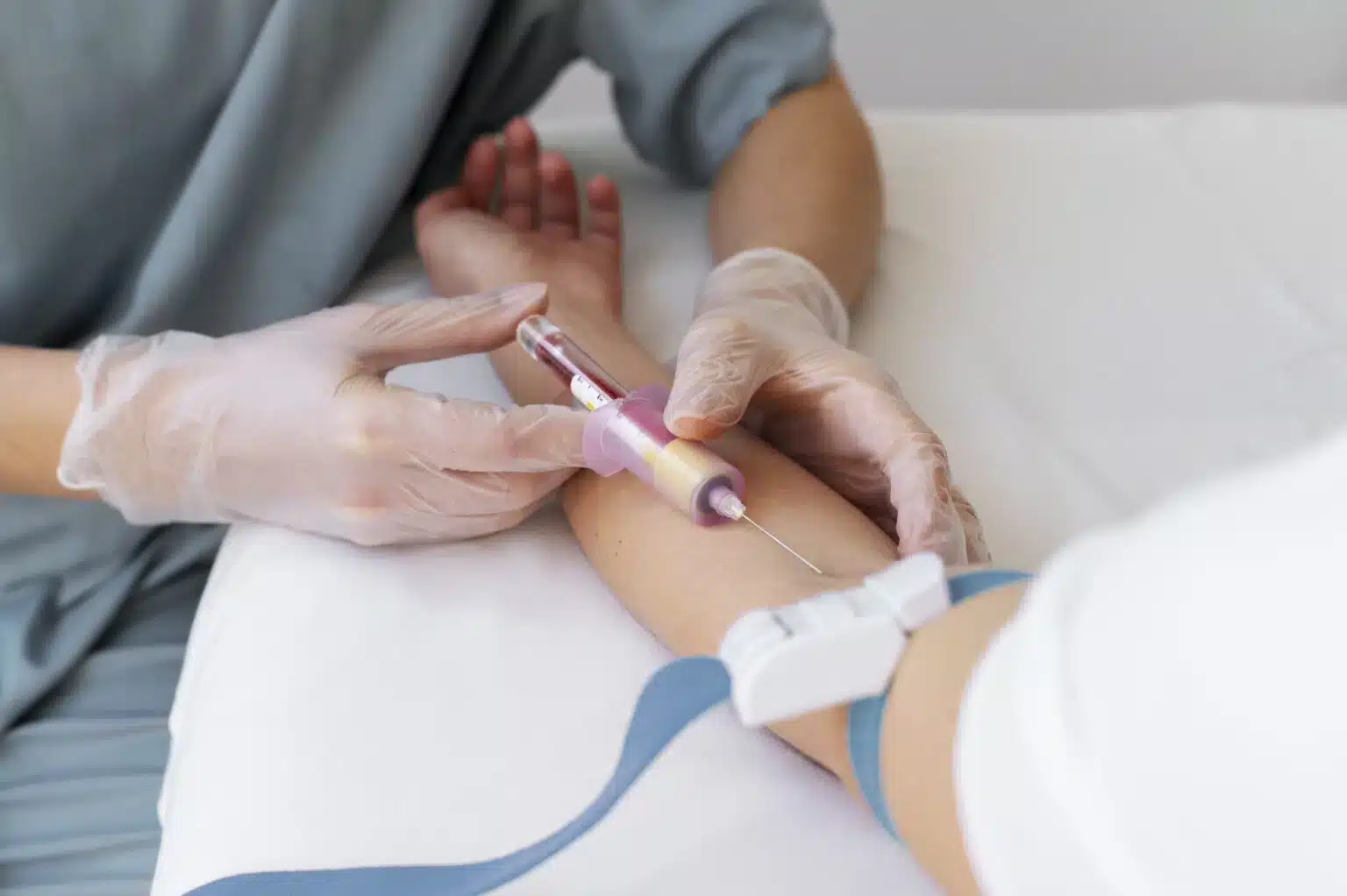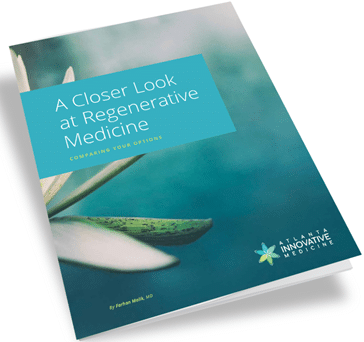By Farhan Malik, MD
Atlanta Innovative Medicine
Cervical radiculopathy is a condition caused by compression or irritation of the nerves in your neck, often due to herniated discs, bone spurs, or degenerative changes. Symptoms typically include neck pain, tingling, numbness, or weakness radiating into your arms.
But beyond the discomfort during your day, cervical radiculopathy can severely interfere with your sleep, making it even harder to find relief. Poor sleep can exacerbate symptoms, creating a frustrating cycle of pain and fatigue.
This article aims to provide practical tips to help you improve your sleep quality while managing the pain and discomfort associated with cervical radiculopathy. It will also help you understand when it’s time to seek professional help.

What Is Cervical Radiculopathy?
Cervical radiculopathy occurs when nerve roots in your neck are compressed or irritated, often resulting from conditions like a herniated disc, bone spurs, or degeneration. Common symptoms include neck pain, radiating pain into the shoulders, arms, or hands, along with numbness, tingling, or weakness.
This condition can impact your daily life, from experiencing pain while simply reaching for your morning coffee to completely disrupting your sleep at night. Without early diagnosis and appropriate treatment, symptoms can worsen, potentially leading to chronic pain and, in some cases, nerve damage. Recognizing the signs and seeking timely care is crucial for preventing long-term complications and nerve injury.

Why Cervical Radiculopathy Affects Sleep
Pain from cervical radiculopathy can keep you from getting a good night’s sleep, and sleeping in the wrong position can also make this pain worse.
When lying in certain positions, nerve compression can intensify, increasing pain and discomfort. Common symptoms like tingling, muscle weakness, or sharp pain can suddenly flare up, making it difficult to fall or stay comfortably asleep throughout the night.
Additionally, poor sleep posture—like sleeping in a twisted or strained position—can put extra pressure on the nerves in your neck, prolonging or worsening symptoms. Finding the proper sleeping position can make a significant difference in managing pain, improving rest, and preventing long-term complications.
Best Sleeping Positions for Cervical Radiculopathy
Sleeping on Your Back: Back sleeping is generally considered ideal for spinal alignment. Using a supportive cervical pillow or placing a rolled towel under the neck will help you maintain a neutral position and reduce pressure on irritated nerves.
Sleeping on Your Side: If you prefer side sleeping, keep your neck aligned with your spine. Use a pillow that maintains the natural curve of your neck, like a contoured or orthopedic pillow. A body pillow can also help keep your spine aligned and prevent tossing and turning.
Avoid Stomach Sleeping: Stomach sleeping can severely aggravate nerve compression, as it twists the neck unnaturally and puts strain on the cervical spine. It’s best to avoid this position altogether.

Tips to Manage Symptoms Before and During Sleep
In addition to optimizing your sleeping position and improving your sleep posture, there are simple actions you can take throughout the day and before bed to help manage your symptoms more effectively.
Gentle Stretches and Exercises: Light neck stretches can help alleviate pressure on the nerves. Try chin tucks, gentle side bends, and neck rolls to improve mobility and reduce tension. Always perform these gently and consult your healthcare provider before starting new exercises. Working with a physical therapist is a great option if you’d like a personalized exercise plan.
Pain Management Techniques: Over-the-counter medications like NSAIDs may offer temporary relief (remember, always follow your doctor’s guidance when using any medication). Non-invasive therapies, including ozone therapy, can also support healing and reduce nerve inflammation.
Avoid Aggravating Activities: Limit activities that strain your neck, such as repetitive overhead reaching or craning your neck forward, like when you’re looking at a computer or mobile device. Be mindful of your posture and take regular breaks to stretch and move throughout the day. Additionally, avoid high-impact exercise, especially when your symptoms are flaring, as it can further aggravate nerve compression and delay healing.


Subscribe for Expert Insights and Our Ebook
A Closer Look at Regenerative Medicine: Comparing Your Options Learn about treatment options like Platelet Rich Plasma (PRP), Prolozone Therapy, and Stem Cell Therapy.
What Happens If Cervical Radiculopathy Is Left Untreated?
Ignoring symptoms of cervical radiculopathy can lead to long-term issues, including chronic pain, nerve damage, and decreased mobility. Over time, the constant nerve irritation may cause permanent nerve injury or muscle weakness, significantly impacting your quality of life.
We’ll say it again: early intervention is key to preventing these complications. Timely treatment can alleviate pain, restore function, and prevent nerve damage.
When to Seek Professional Medical Help
If you experience persistent or worsening neck pain, difficulty sleeping despite making adjustments, weakness, numbness, or tingling in your arms that doesn’t improve, it’s crucial to seek professional care. These symptoms may indicate severe or progressing nerve compression, and professional intervention can help prevent permanent nerve damage or chronic pain.
At Atlanta Innovative Medicine, our team uses non-surgical, orthopedic therapies to diagnose and treat cervical radiculopathy and other painful back and neck conditions like sciatica and spinal stenosis. We offer a variety of personalized treatments designed to reduce pain, decompress nerves, and support your body’s natural healing process.
Two of the treatments we offer and generally recommend for cervical radiculopathy include:
- Ozone Therapy: A minimally invasive treatment that reduces inflammation and promotes tissue repair, helping to relieve nerve impingement and discomfort.
- Spinal Decompression: A gentle, non-invasive technique that stretches the spine to reduce pressure on affected nerves, improving blood flow and accelerating healing.
Our goal is to create a treatment plan that targets the root cause of your symptoms, helping you regain mobility and enjoy a better quality of life without surgery. Schedule a consultation with our team today and explore your personalized options for relief.

Living with cervical radiculopathy can be challenging, but prioritizing proper sleep posture, creating an optimal sleep environment, and effectively managing your symptoms can make a significant difference. Minor adjustments—like choosing the right pillow, maintaining good neck alignment, and avoiding positions that aggravate nerve compression at night and during the day—can help you achieve a more restful night’s sleep.
Remember, early treatment is essential to reducing pain and preventing nerve damage and long-term complications. At Atlanta Innovative Medicine, we offer personalized treatment plans tailored to your unique needs and goals, guiding you toward relief and renewed vitality. Schedule your appointment today to prioritize your rest for a healthier tomorrow!
Quizzes
Are you a candidate for Regenerative Medicine?
Regenerative medicine can be an effective therapy and treatment option for lasting pain relief for a variety of conditions like osteoarthritis of the knee, hip or shoulder; ACL or meniscus tears; tennis or golfer’s elbow; chronic neck and back pain; and more.
Is it right for you and your condition? Take 1 minute to answer a few “yes or no” questions that help to assess if you might be a candidate for PRP, stem cell or other nonsurgical regenerative treatments.
Are You a Stem Cell Candidate for Your Joint or Spine Damage?
Are you a candidate for Platelet Rich Plasma (PRP) Therapy?
Do I have nonsurgical options for my injured or aging joints?
Take the Pain Medications Risk Quiz

Regenerative Medicine.
Reimagined
- Advanced hybrid therapies, including Mesenchymal Stem Cell therapy combined with different mechanisms of action that synergistically come together to support ultimate healing
- More powerful PRP that’s customized, amplified and personalized
- Therapies delivered by an experienced, compassionate team comprised of multidisciplinary experts in traditional and alternative medicine working as your team: Medical Doctors, Nurse Practitioners, Physiotherapists and Chiropractors
- Advanced training through the American Academy of Orthopedic Medicine, the American Osteopathic Association of Prolotherapy Regenerative Medicine, and more
All content of this page is for informational purposes only and is not intended to serve as a substitute for the consultation, diagnosis, and/or medical treatment of a qualified physician or healthcare provider. Individual results may vary. Your medical professional can explain all the risks and potential benefits of any therapy based on your specific circumstances. At this time regenerative therapies are not FDA approved. Neither Atlanta Innovative Medicine nor its physician affiliates promise regenerative therapies as a cure for any condition, disease, or injury.
Other Atlanta Areas We Service:
© 2024 Atlanta Innovative Medicine, LLC. All Rights Reserved. AIM Scholarship Opportunity








